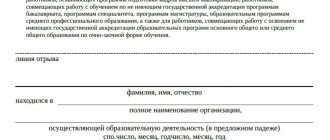Summer is vacation time! Not only ordinary company employees take their “golden” two weeks of rest, but also their management, who wants to rest! For an accountant or his senior colleague, the director going on vacation means working without their immediate superiors, which definitely makes adjustments to their daily routine. In most cases, unfortunately, an accountant is a “bonded” person; all financial issues must be coordinated, all actions with counterparties must be discussed, the wording in contracts must be exactly as the management wants, etc. The topic of our article: “How to solve work issues yourself” is not accidental, because we will try to convey to the accountant a procedure that will help bring into his work process more “legitimate” initiative, more independence and, perhaps, more positive aspects from realizing responsibility for his work.
The manager and his competence
In Article 273 of the Labor Code of the Russian Federation, the head of an organization is characterized as an individual who, in accordance with the Labor Code of the Russian Federation, other federal laws and other regulatory legal acts of the Russian Federation, laws and other regulatory legal acts of the constituent entities of the Russian Federation, regulatory legal acts of local government bodies, constituent documents of a legal entity ( organization) and local regulations manages this organization, including performing the functions of its sole executive body.
The manager is the sole executive body of the company (director, general director, president, etc.), who is elected by the general meeting of the company's participants for a period determined by its charter, unless the charter refers to the resolution of these issues within the competence of the board of directors (supervisory board) of the company. The sole executive body of the company may not be elected from among its participants.
The head of the institution (hereinafter referred to as the director) as an employee is subject to labor legislation, and as an executive body - to civil law. The effect of labor legislation, in particular Ch. 43 of the Labor Code of the Russian Federation , applies to the heads of all organizations, regardless of their organizational and legal forms and forms of ownership, except for those cases when:
- the head of the organization is the only participant (founder), member of the organization, owner of its property;
- The management of an organization is carried out under an agreement with another organization (management organization) or an individual entrepreneur (manager) ( Part 2 of Article 273 of the Labor Code of the Russian Federation ).
In addition, the activities of the director are regulated by the provisions of other laws and regulations applicable to the heads of a particular type of organization. The most common forms of commercial organizations are limited liability companies and joint stock companies. Accordingly, we can highlight federal laws dated 02/08/1998 No. 14-FZ “On Limited Liability Companies” (hereinafter referred to as the LLC Law ) and dated 12/26/1995 No. 208-FZ “On Joint-Stock Companies” .
Individual entrepreneurs in matters of labor activity are guided by the Labor Code.
In accordance with paragraph 4 of Art. 32 and art. 40 of the LLC Law, the competence of the director includes all current issues of managing the company’s activities, if, according to the law or the company’s charter, their decision is not within the competence of the general meeting of LLC participants, the board of directors (supervisory board) and the collegial executive body of the company. Director, in particular:
- acts on behalf of the company without a power of attorney, including representing its interests and making transactions;
- issues powers of attorney for the right of representation on behalf of the company, including powers of attorney with the right of substitution;
- issues orders on the appointment of company employees to positions, on their transfer and dismissal, applies incentive measures and imposes disciplinary sanctions;
- exercises other powers that are not within the competence of the general meeting of the company's participants, the board of directors (supervisory board) of the company and the collegial executive body of the company.
The procedure for the director's activities and decision-making is regulated by the company's charter, internal documents of the company, as well as an agreement concluded between the company and the director.
What documents need to be prepared{q}
Transfer of vacation: how to formalize{q} The transfer must be properly completed to avoid problems with the law.
https://www.youtube.com/watch{q}v=ytcreatorsru
There is a strict procedure for registration, where the first point is the initiator of the transfer, and on this basis an order is issued.
The procedure might look like this:
- Employee application and registration.
- Issuance of an order and its registration.
- Familiarization of the employee with the order.
- Making changes to the vacation schedule.
- Making changes to your personal card and time sheet.
- Recalculation of vacation pay.
No additional certificates or documents, the only thing required is a motivational justification, but it is also an application.
Whatever orders the employer issues as the initiator of the transfer of leave, they have no legal force without the consent of the employee.
- The application is written to the director, the text indicates the reason for the transfer, the date and signature of the applicant are indicated.
- The order begins with the reason, after which there is a list of points under the word “I order”:
reschedule the date based on the order, indicate its number and date; - make the necessary changes to extend the vacation to the schedule;
- familiarize the necessary personnel with this order, for example, the head of personnel or the head of the sales department;
- after this, the basis is displayed, that is, the corresponding statement of the employee, the signature of the director and those who are familiar with the order.
- The employer's initiative can be legalized with the help of a memo. Start with the words “I ask you to reschedule your vacation due to something...”. Indicate the employee's name and deadlines. Naturally, with all the details. If the date is not determined, then make a proposal to issue a new date when drawing up a schedule for the next year.
- The employee’s consent to the transfer is also drawn up in the form of an application; here too, details cannot be avoided. The text begins with the word “agree”, then the dates, from where and to where are indicated.
- Vacation feedback can be submitted in the form of a proposal. Contact the employee, indicate the reason for the recall and the remaining time off, which can be transferred to the next year or “any other convenient time.” For example, when an ill employee returns. Of course, the employee’s written consent is required for revocation.
- The order for revocation is written according to the same template, but not in the intonation of the petitioner. Withdraw, make changes, indicate what to do with the unused part of the time off, bring to the attention of the employee and the head of the personnel department, and so on.
Registration of director's leave
First of all, let us remind you that the right to use vacation for the first year of work arises for the director after six months of his continuous work with this employer. By agreement of the parties, paid leave can be provided before the expiration of six months ( Article 122 of the Labor Code of the Russian Federation ).
The order of provision of paid vacations is determined annually in accordance with the vacation schedule approved by the employer, taking into account the opinion of the elected body of the primary trade union organization no later than two weeks before the start of the calendar year in the manner established by Art. 372 of the Labor Code of the Russian Federation for the adoption of local regulations ( Article 123 of the Labor Code of the Russian Federation ).
The director must be notified of the start time of the vacation against signature no later than two weeks before its start.
And here the question immediately arises: what document is used to document the director’s leave and who signs this document? It all depends on whose competence it is to grant leave to the director. If it is within the competence of the founders of the company, then the granting of leave is formalized by the minutes of the general meeting of the company's participants (a decision of one participant) and an order drawn up in any form and signed by a person authorized by the founders. Why in any form? Because an order drawn up according to the unified T-6 form can only be signed by the head of the organization or the person performing his duties.
If granting leave to a director is within the competence of the founders of the company, it seems that initially, before drawing up the vacation schedule, the director must agree with the founders on the estimated date of his leave.
For your information
By virtue of Art. 33 of the LLC Law , the competence of the general meeting of the company’s participants includes, in particular, the formation of the executive bodies of the company and the early termination of their powers, if the company’s charter does not include the resolution of these issues within the competence of the board of directors (supervisory board) of the company. As for the powers to resolve other issues related to the activities of the manager, including the provision of leave, they can be determined by the charter of the company.
If the provision of leave is within the competence of the director himself, then everything is much simpler. The director issues an order granting leave and signs it himself.
If, due to production needs, it is necessary to recall the director from leave, then (again, depending on whose competence it is to grant leave to this employee), the recall is carried out by the founders of the company on the basis of a protocol (decision) and order, or by the director himself, who himself draws up and signs an order for early departure from vacation.
For your information
The director's recall from vacation is permitted only with his consent. The part of the vacation not used in this regard must be provided at the director’s choice at a time convenient for him during the current working year or added to the vacation for the next working year ( Article 125 of the Labor Code of the Russian Federation ).
Order to postpone vacation: sample for 2021
The dates of annual leave are usually determined in advance in a special schedule, but there may be cases where vacation dates are transferred to another period or even another year. You can reschedule rest time based on the order of the manager, if there is appropriate reason.
In this article below you can download sample orders on the basis of which it is legal to transfer rest time to other dates at the initiative of the employee, in connection with sick leave, production needs, etc.
When is an order to postpone vacation issued?
Labor legislation (Article 124 of the Labor Code of the Russian Federation) regulates the possibility of transferring or extending annual paid leave. This standard takes into account the needs of employees as much as possible and helps the employer simplify the organization of uninterrupted operation of the company.
Situations in which the employer is obligated to extend or postpone the vacation:
- illness, injury received during vacation (when applying for sick leave);
- exemption from work by law (weekends and holidays coincide with the vacation period);
- other cases specified in the current legislation and local regulations of the company.
At the request of the employee, where his own initiative is indicated, and in agreement with the administration of the enterprise, the vacation is postponed to another period if the payment of vacation pay was not made in a timely manner.
Rest is also postponed in the absence of written notice to the employee no later than 14 days before the first day of vacation.
There are also unspoken rules among employers, following which some reasons for transfer at the initiative of the employee can be considered valid:
- death of a close relative;
- illness of the child, leave is postponed to an earlier date for care;
- spa treatment, rehabilitation period after surgery;
- forced trip within Russia or abroad.
In all these cases, the employee submits a written statement indicating the reason for postponing the vacation “family circumstances,” and the employer draws up an order.
As an exception, a deferral may be permitted due to operational necessity if the provision of leave as scheduled would adversely affect the company's performance indicators. This procedure is possible only with the consent of the employee.
Pregnant employees can take leave at any time convenient for them, regardless of the approved schedule.
We recommend: Sample applications for rescheduling vacation for various reasons.
Documents grounds for transfer
If the employer violates the deadline for notifying the employee about the start of vacation or if payment is untimely, the transfer is carried out if a corresponding application is received from the employee. The employee himself takes the initiative. Based on the employee’s application, an order is drawn up.
Important: The employer must notify you 2 weeks before the start of the vacation, and pay vacation pay 3 days before it starts.
If during the vacation period the employee fell ill (opened a sick leave) or was called upon to perform government duties (participation in court hearings, being sent to military training, being called to the prosecutor’s office for questioning), which exempt him from work under labor law, then in these cases the vacation is automatically extended. , and the employee goes to work later. It is possible not to extend the current vacation, but to transfer vacation days that coincide with sick leave or performance of duties to another later date. This requires an initiative from the employee as an application and the consent of the employer. The result is a completed transfer order.
To transfer vacation days in these cases, the supporting documents are a certificate of incapacity for work, certificates from government bodies confirming the employee’s compliance with the law on a certain day.
How to postpone vacation to next year at the employee’s initiative?
The employer is obliged to provide leave to staff at least once every 2 calendar years, otherwise they are subject to sanctions.
An employee has the right to apply to the director with a request to postpone previously agreed vacation dates to the next year. If the applicant’s petition does not indicate cases as reasons for changing the rest period (Article 124 of the Labor Code of the Russian Federation), the occurrence of which the employer cannot refuse, then when considering it, the director can make decisions at his own discretion.
Satisfactory resolution of the issue of postponing vacation dates to another period at the initiative of the employee due to family circumstances is accompanied by the issuance of an order and amendments to the vacation schedule. To increase the chances of obtaining consent from the manager, the reasons must be stated in more detail in the statement.
orders
order to postpone vacation to the next year at the initiative of the employee - word.
Due to sick leave
An employee has the right to send an application to the employer to postpone vacation if he has a certificate of incapacity for work - download a sample application. if the disease progressed without consulting a doctor, then this circumstance is not a basis for changing the rest period.
Only a sick leave certificate can become the basis for changing the dates of annual leave. the employee either returns to work later, that is, the rest is extended, or vacation days are postponed to a later date.
extension is possible automatically on the basis of sick leave only, without filing applications or orders. If an employee wishes to reschedule his vacation, he must write an application and obtain the employer’s approval.
To transfer the holiday, the following documents are drawn up:
- a statement from the employee indicating the desire to postpone the vacation;
- sick leave, issued when the patient goes to a medical institution;
- an order stating the director’s order to change the employee’s vacation dates;
- schedule t-7, amendments are made based on the signed order.
You can only transfer the number of days that are indicated on the certificate of incapacity for work.
order to reschedule due to sick leave - word.
For production needs
At the initiative of the employer, changing the vacation period is allowed in accordance with the norms of the Labor Code of the Russian Federation and with the consent of the employee.
The reason for postponing an employee’s vacation may be an emergency (exceptional) situation at the enterprise or production necessity.
But there are no clear formulations of such incidents in the law. In practice, such situations include:
- inspection of the company's activities by regulatory authorities;
- submission of mandatory reporting;
- business trip;
- receipt of new equipment and technology for introduction into the technological process.
If an employee is on vacation and there is a need to call him to work due to production needs, then an order is drawn up to recall him to work ahead of schedule. A vacationer can be recalled ahead of schedule only with his consent.
Sample design
order to reschedule rest due to production needs - word.
conclusions
Transferring vacation without the employee's consent is a violation.
The issue of changing the terms of the vacation period often becomes the cause of proceedings and labor disputes, the resolution of which is possible only through the courts.
The employer has the right to refuse to postpone the vacation of an employee if the circumstances for this are not mandatory in accordance with the Labor Code.
Article 124 of the Labor Code of the Russian Federation establishes a ban on any change in rest periods for minors and employees working in hazardous and hazardous areas of production.
All other cases are subject to personal assessment by the manager; he may refuse the applicant’s application. The determination of the degree of “respect” is left to the head of the enterprise personally. If a subordinate does not agree with the decision made, then he must go to court.
If it is necessary to take a vacation, but the director does not meet his subordinate, then it is allowed to take a vacation at his own expense.
Transfer of powers of the director
So, before going on vacation, the director must transfer his powers to another employee, who will manage the organization instead: sign employment contracts with new employees, contracts with contractors, accounting and tax reporting documents, etc. In addition, it is possible , you will have to represent the organization in government bodies, courts, etc. First, the director must issue an order on the temporary performance of the duties of a manager by his replacement employee.
We provide a sample of such an order on page .
You should also issue a power of attorney to transfer part or all of the director’s powers. There can be one power of attorney for the transfer of both internal powers and external ones - for representing the interests of the organization before third parties (in other companies, government bodies and courts), or there can be several.
| Limited Liability Company "Alliance" Alliance LLC ORDER on assignment of responsibilities Krasnodar March 25, 2015 Due to another vacation I ORDER: to assign the duties of director to Deputy Director V.P. Kornilov during my vacation - from March 30 to April 13, 2015. Director Alexandrov V.P. Alexandrov |
Some experts propose to delegate the powers of a director within the organization by means of an order listing all delegated powers, and to third parties - by a power of attorney. There is no fundamental difference here, and we believe that powers exercised within an organization can be formalized either by order or by power of attorney. Here is a sample order.
| Limited Liability Company "Alliance" Alliance LLC ORDER on the transfer of powers Krasnodar March 25, 2015 Due to another vacation I ORDER:
Director Alexandrov V.P. Alexandrov |
As for representing interests in other organizations, a power of attorney is required.
In this case, it is not necessary to issue a notarized power of attorney. A power of attorney on behalf of a legal entity is issued signed by its director or another person authorized to do so in accordance with the law and constituent documents ( Part 4 of Article 185.1 of the Civil Code of the Russian Federation ). In this case, the organization’s seal may not be affixed. However, in some cases, for example, for participation in civil and arbitration proceedings, the signature of the principal must be certified by the seal of the organization ( clause 3 of article 53 of the Civil Procedure Code of the Russian Federation, clause 5 of article 61 of the Arbitration Procedure Code of the Russian Federation ).
The power of attorney is issued on the company's letterhead, which contains its basic details. The power of attorney should indicate the date of issue, the validity period of the power of attorney, the person issuing the power of attorney (director), the person to whom the power of attorney is issued (representative), the powers being transferred and the signature of the principal.
To represent the interests of the organization in other institutions, in order to avoid misunderstandings, we recommend that when formulating such authority not to use the phrase “to represent the interests of the Company in any enterprises, institutions, organizations, regardless of their form of ownership,” but to indicate specific government institutions, for example: “... to represent the interests of the Company in tax authorities, state extra-budgetary funds, internal affairs bodies and other institutions and organizations, regardless of their form of ownership, and perform all actions related to representing the interests of the Company in these bodies, institutions and organizations.”
Postponement of the CEO's leave
According to the law, the employer has a vacation schedule that allows it not to disrupt the production process during the calendar year and systematically provide it to employees. But even this does not guarantee strict adherence to the schedule for workers to take legal leave.
The reasons may include the following:
- employee’s incapacity for work, that is, sick leave;
- performance of government duties during vacation, military training or court hearings;
- other reasons provided for by the internal documents of the organization.
https://www..com/watch{q}v=ytpressru
Let's find out what other reasons there are for postponing your vacation. If the above reasons can be considered the main ones, then there are particular ones. For example, the employee was not given vacation pay, was not notified two weeks in advance, or he expressed a desire not to go on vacation for family reasons. In such cases, you will need to provide the employer with a written application for vacation compensation.
The rules on regular and additional vacations, namely paragraph 17, require the employee to provide the necessary documents that will prove the impossibility of using vacation days at the appropriate time. Most often, this is simply not required, thanks to local regulations.
It will be sufficient for the employer to request that the transfer of annual leave will not have a negative impact on production.
Important! Persons under eighteen years of age may have vacation days at any convenient time.
In addition to legislative regulation, there is communication within the enterprise, where employees can discuss details in advance, change places in line, and so on.
Such transfer of vacation days at the request of the employee is not welcomed, because it is fraught with a fine under Article 5.27 of the RF Code of Administrative Offenses.
The employee may also be prevented from spending his vacation days in full and urgently called to work; in this case, he has the legal right to postpone his vacation due to production needs to another time.
Code of Administrative Offenses of the Russian Federation, Article 5.27. Violation of labor legislation and other regulatory legal acts containing labor law norms
- Violation of labor legislation and other regulatory legal acts containing labor law norms, unless otherwise provided by parts 2 and 3 of this article and article 5.27.1 of this Code, entails a warning or the imposition of an administrative fine on officials in the amount of one thousand to five thousand rubles ; for persons carrying out entrepreneurial activities without forming a legal entity - from one thousand to five thousand rubles; for legal entities - from thirty thousand to fifty thousand rubles.
- Actual admission to work by a person not authorized to do so by the employer, in the event that the employer or his authorized representative refuses to recognize the relationship that has arisen between the person actually admitted to work and this employer as labor relations (does not conclude with the person actually admitted to work for work, employment contract), entails the imposition of an administrative fine on citizens in the amount of three thousand to five thousand rubles; for officials - from ten thousand to twenty thousand rubles.
- Evasion from registration or improper execution of an employment contract or the conclusion of a civil contract that actually regulates labor relations between an employee and an employer shall entail the imposition of an administrative fine on officials in the amount of ten thousand to twenty thousand rubles; for persons carrying out entrepreneurial activities without forming a legal entity - from five thousand to ten thousand rubles; for legal entities - from fifty thousand to one hundred thousand rubles.
- The commission of an administrative offense provided for in Part 1 of this article by a person who has previously been subjected to administrative punishment for a similar administrative offense shall entail the imposition of an administrative fine on officials in the amount of ten thousand to twenty thousand rubles or disqualification for a period of one to three years; for persons carrying out entrepreneurial activities without forming a legal entity - from ten thousand to twenty thousand rubles; for legal entities - from fifty thousand to seventy thousand rubles.
- The commission of administrative offenses provided for in parts 2 or 3 of this article by a person who has previously been subjected to administrative punishment for a similar administrative offense entails the imposition of an administrative fine on citizens in the amount of five thousand rubles; for officials - disqualification for a period of one to three years; for persons carrying out entrepreneurial activities without forming a legal entity - from thirty thousand to forty thousand rubles; for legal entities - from one hundred thousand to two hundred thousand rubles.
Sample transfer of leave due to production needs.
Separately, it is worth noting employees who decided to take paid rest before (or after) maternity leave. You can learn more about how to postpone the vacation period after maternity leave in the article at the link.
Sample application for maternity leave.
Spouses of military personnel and men whose wives are on maternity leave are also here. In all these cases, the employer is obliged to meet the employee halfway.
An employer has no reason to refuse to transfer vacation days to someone who is going to care for a disabled child, but the employee must document the following facts:
- child's disability;
- his presence at home, and not in special. institution;
- the other parent did the same to care for the child.
The most intriguing question in office work is how you can reschedule your boss’s vacation. If the director issues orders and provides annual paid days off to employees, then how can he himself go on legal vacation? {q} Such issues should be regulated by local regulations, that is, the charter of the organization.
There can be only two scenarios: the director writes an application for leave or does not write.
If the procedure is not reflected in the charter, then the director has the right to plan his own vacation, but his name must also be on the vacation schedule.
The Labor Code does not specifically designate the person who sends employees a warning about the start of vacation.
The director's leave, like that of an ordinary employee, is filled out on a unified form. And then a fair question arises: who signs, if the director usually signs here {q} That’s right, the director himself. Not only under the application itself, but also in the “Acquainted” column.
During absence, the director transfers his duties to the deputy. If there is none, then an order is written to assign the duties of the head of an enterprise or company to an employee. At the same time, an additional payment is implied for combining positions.
Will the salary be maintained or not{q}
Many workers, despite their extensive experience, do not distinguish between wages and vacation pay. Salaries are paid for time worked and are calculated on working days, while vacation pay is calculated based on average earnings and are paid per calendar days.
Therefore, it makes sense not to rest in January or May, this will not bring financial benefits. In any case, the transfer of the vacation period does not affect wages and vacation pay in any way, because it is approved by law and is due to every employee annually.
As a result, postponing the vacation period due to unpaid leave is pointless. The employee is paid vacation pay, not salary.
What documents need to be prepared{q}
Transfer of vacation: how to formalize{q} The transfer must be properly completed to avoid problems with the law.
https://www..com/watch{q}v=ytcreatorsru
There is a strict procedure for registration, where the first point is the initiator of the transfer, and on this basis an order is issued.
The procedure might look like this:
- Employee application and registration.
- Issuance of an order and its registration.
- Familiarization of the employee with the order.
- Making changes to the vacation schedule.
- Making changes to your personal card and time sheet.
- Recalculation of vacation pay.
No additional certificates or documents, the only thing required is a motivational justification, but it is also an application.
Whatever orders the employer issues as the initiator of the transfer of leave, they have no legal force without the consent of the employee.
- The application is written to the director, the text indicates the reason for the transfer, the date and signature of the applicant are indicated.
- The order begins with the reason, after which there is a list of points under the word “I order”:
- reschedule the date based on the order, indicate its number and date;
- make the necessary changes to extend the vacation to the schedule;
- familiarize the necessary personnel with this order, for example, the head of personnel or the head of the sales department;
- after this, the basis is displayed, that is, the corresponding statement of the employee, the signature of the director and those who are familiar with the order.
- The employer's initiative can be legalized with the help of a memo. Start with the words “I ask you to reschedule your vacation due to something...”. Indicate the employee's name and deadlines. Naturally, with all the details. If the date is not determined, then make a proposal to issue a new date when drawing up a schedule for the next year.
- The employee’s consent to the transfer is also drawn up in the form of an application; here too, details cannot be avoided. The text begins with the word “agree”, then the dates, from where and to where are indicated.
- Vacation feedback can be submitted in the form of a proposal. Contact the employee, indicate the reason for the recall and the remaining time off, which can be transferred to the next year or “any other convenient time.” For example, when an ill employee returns. Of course, the employee’s written consent is required for revocation.
- The order for revocation is written according to the same template, but not in the intonation of the petitioner. Withdraw, make changes, indicate what to do with the unused part of the time off, bring to the attention of the employee and the head of the personnel department, and so on.
How to reflect changes in graphics{q}
Please note how to make changes to your vacation schedule when rescheduling your vacation. Two weeks before the start of the new year, it is necessary to complete the work with the vacation schedule and approve it.
If this does not happen, then administrative penalties will follow.
Of course, a lot can happen in a year, including the need to change the date at the initiative of the employee or employer.
Often it is not possible to strictly adhere to the schedule, so it is necessary to periodically make appropriate changes to it.
Do not leave blank lines next to the names of employees, this is considered a violation. It is better to provide approximate deadlines than to provide absolutely nothing.
When changing vacation dates or transferring them to another month of the calendar year, the details of the corresponding document and the new date are indicated in the schedule. If vacation days carry over to the next year, then it would be correct to formalize it in the “Note” column, and not wait until December and draw up a new schedule.
Of course, a company can hire or fire employees during the calendar year. In this case, the schedule loses its relevance, and the organization faces a fine.
At the same time, the legislation does not clearly state how exactly changes should be made to the vacation schedule, so use the “Note” column, where you indicate the date of dismissal of the employee.
Methods for replacing a director
We have sorted out the transfer of powers.
However, in addition to this, the replacement of the director’s position should be documented. And depending on the replacement method, there are several design options. Let's look at them. 1. The director has a full-time deputy and the duties of the replacement are specified in his employment contract and job description. Some experts believe that in this case there is no need to issue an order and draw up a power of attorney. But we think differently: regardless of whether the duties for replacing the director are specified in the employment contract, job description, both the order and the power of attorney are needed. At the same time, it is enough to issue them once, and not every time when the director goes on vacation, because in addition to vacation, he may be on sick leave, on a business trip, etc. The order states that the performance of the duties of the director is assigned to the deputy director during his absence .
2. The duties of the director are performed by another employee of the organization in a combination of positions.
According to Art. 60.2 of the Labor Code of the Russian Federation, with the written consent of the employee, he may be entrusted with performing, during the established duration of the working day, along with the work specified in the employment contract, additional work in a different or the same profession (position) for an additional fee.
The combination is formalized by concluding an additional agreement to the employment contract, which establishes the period during which the employee will perform additional work, its content and volume, as well as the amount of additional payment.
Thus, when combining the position of director, the following documents are required: the employee’s written consent to combine the position of director, an agreement to the employment contract, an order to perform the duties of a director in order to combine positions, a power of attorney for the transfer of powers.
In addition to part-time work, the Labor Code also provides for such a form of performing other work as part-time work - performing, in free time from the main job, another regular paid job for the same employer (internal part-time work) and (or) for another employer (external part-time job) ( Article 60.1 Labor Code of the Russian Federation ). However, we will not consider this method, since this form of filling the position of director is not used in practice.
3. The duties of the director are performed by another employee of the organization by way of temporary transfer.
By virtue of Art. 72.2 of the Labor Code of the Russian Federation , by agreement of the parties, concluded in writing, an employee may be temporarily transferred to another job with the same employer for a period of up to one year, and in the case where such a transfer is carried out to replace a temporarily absent employee, for whom, in accordance with the law, the place of work is retained until the employee returns to work. According to Part 1 of Art. 72.1 of the Labor Code of the Russian Federation, transfer is permitted only with the written consent of the employee, with the exception of certain cases established by Art. 72.2 Labor Code of the Russian Federation .
Thus, when transferring an employee to the position of director, the employee’s written consent, an additional agreement to the employment contract, an order for temporary transfer to the position of director during his absence, and a power of attorney are also required.
Let us remind you that according to Part 1 of Art. 72.2 , if at the end of the transfer period the employee’s previous job is not provided, and he did not demand its provision and continues to work, then the condition of the agreement on the temporary nature of the transfer loses force and the transfer is considered permanent.
4. The duties of the director’s position are performed by an external employee under a fixed-term employment contract. Let’s say right away that this method is usually used when the director goes on long leave, for example, for maternity or child care.
In this case, a fixed-term employment contract is concluded for the duration of the duties of the absent employee, who, in accordance with labor legislation and other acts containing labor law norms, a collective agreement, agreements, local regulations, and an employment contract, retains his place of work ( Article 59 of the Labor Code of the Russian Federation ).
There is no need to draw up other documents in case of concluding a fixed-term employment contract, since the employee is already accepted to the position of director with all the relevant powers.
Postponement of vacation: possible, necessary and impossible
Undoubtedly, sooner or later, every working citizen wants to take a break from fulfilling his work obligations.
The provisions of legislative acts provide employed persons with the right to go on leave, the observance of which is strictly controlled by the relevant government bodies.
The mandatory rest period is an annual vacation of 28 calendar days, however, this period can be extended by a certain number of additional days off.
It happens that some workers do not have time to take advantage of the entire required period of rest, as a result of which they ask the question: how to transfer the vacation to the next year? The Labor Code allows this measure to be implemented if there are certain grounds, which we will consider below.
The possibility of carrying out the transfer procedure is provided to the parties to the labor relationship by the provisions of the following documents:
- The Labor Code of our country, which sets out the basic requirements for procedures carried out between an employer and a subordinate;
- A collective agreement developed at each enterprise exclusively for its employees. Each employee must be familiarized with the document at the time of employment under a personal signature. The employer must notify all of its subordinates about their labor rights, which can be used during their work;
- An individual employment contract concluded between an employer and a specific employee. The document may contain individual privileges intended specifically for a given person;
- Other local documents of the organization.
Features of transferring vacation to next year
According to the norms of labor legislation, and more specifically Article 124, the transfer of a certain part of the vacation period to the next working period is allowed only if the following conditions are met:
- Mutual agreement between employer and subordinate. It is impossible to carry out this procedure if one of the parties to the labor relationship is against its implementation;
- The presence of serious reasons;
- The labor obligations assigned to the employee can be carried out continuously throughout the year without harm to health.
The main features of the vacation transfer procedure include:
- The annual leave provided by the Law does not automatically expire if it has not been used in full. In this case, the remaining days off are added to the vacation period of the next year;
- Transfer of leave is allowed only if the employee’s health does not suffer harm or any other damage;
- It is not allowed to carry forward part of the vacation 12 months in advance for pregnant women, minor teenagers and employees working in hazardous workshops. The entire number of days off provided must be used by individuals in the current working period;
- Carrying forward holidays not taken is allowed only 1 year in advance. Carrying out this procedure for two consecutive years is prohibited;
- If the employer violates the requirements of the Labor Code of the Russian Federation, the employee can contact the relevant government bodies that are responsible for monitoring compliance with the labor rights of employees.
Transfer of vacation to the next working period at the initiative of the employee
The transfer of days of required rest can be carried out at the proposal of any of the parties to the labor relationship.
If this decision is made on the initiative of the employee , then he is obliged to provide the appropriate grounds, which will need to be presented to the employer at the time of filing the application.
As a rule, the desire to transfer part of the vacation to the next year arises when an employee has certain plans/events that require more days off than are provided annually under the Law.
The most significant circumstances that can be presented to the employer are:
- Situations in which the employee’s illness or injury that requires long-term treatment occurs during the vacation period. If the employee receives a certificate of incapacity for work, the employer is obliged to extend the current vacation to the subordinate or postpone the period of rest, similar to the number of days of illness, to other dates, including 12 months in advance;
- The employer did not accrue the appropriate amount of vacation funds to the subordinate 3 days before the start of the vacation. The employee, in turn, has the right to write an application to transfer the granted period to other dates;
- Lack of a notification document that must be sent by the boss 14 days before the start of the upcoming vacation;
- The citizen’s vacation period coincided with the fulfillment of state tasks assigned to him that required urgent solutions;
- Other circumstances that are recorded by the legislator in regulations.
When do you need to reschedule your vacation?
Annual paid leave must be transferred to another period determined by the employer taking into account the wishes of the employee in the following cases:
- temporary disability of the employee (paragraph 2, part 1, article 124 of the Labor Code of the Russian Federation);
- the employee performs state duties during the annual paid leave, if for this purpose the labor legislation provides for exemption from work (paragraph 3, part 1, article 124 of the Labor Code of the Russian Federation);
- in other cases provided for by labor legislation, local regulations (paragraph 4, part 1, article 124 of the Labor Code of the Russian Federation).
In addition, the Ministry of Labor of the Russian Federation does not exclude the possibility of postponing annual paid leave in connection with the provision of maternity leave to an employee (see letter dated September 20, 2021 No. 14-2/B-899).
And if the employee was not paid vacation pay on time or the employee was warned about the start of vacation later than two weeks in advance, then the employer, upon a written application from the employee, is obliged to postpone the annual paid vacation to another period agreed with the employee (Part 2 of Article 124 of the Labor Code of the Russian Federation).
If the employee himself is ill, the employer also has an obligation to extend or postpone the vacation to another date.
Rules for filing an application for transferring vacation
The entire procedure for transferring vacation dates to another period of time is initiated only after the employee submits a special application addressed to the management of the organization. The main purpose of drawing up this document is to present a request for the preservation of non-vacation days and the possibility of using them in a future working period. The application must contain the following details:
- Personal information of the head of the company, indicating his position;
- Personal data of a full-time employee, as well as his position;
- The text part, as previously mentioned, should contain a request to postpone the vacation. It is imperative to indicate which particular period of rest is subject to shift, as well as its new dates;
- The reason on which an employee can transfer a certain part of the vacation to the next year;
- A list of official documents that confirm the existence of the transfer circumstances specified in the application;
- Date of application;
- Personal signature of the applicant employee.
The employer will make a positive decision on this employee’s request only if its implementation does not have a negative impact on the production process and does not in any way infringe on the interests of the employer.
In Russia, the one who knows his rights wins
If you want to know how to solve your specific problem, then ask
our duty lawyer online about this. It's fast, convenient and
for free
or by phone:
Moscow and region:+7
St. Petersburg and region:+7
Federal number:+7
The procedure for transferring vacation to the next year at the initiative of the employer
Employers also have the right to shift the vacation of subordinates to a different time interval than was previously recorded in the vacation schedule, however, this opportunity is given to them only in case of a desperate situation and the impossibility of doing otherwise. The following requirements must be met:
- Transfer is allowed no more than 12 months in advance;
- This employer’s proposal must be agreed upon with the subordinate. If the latter is against its implementation, the employer does not have the right to implement it alone;
- Transferring a vacation period is possible only in case of production necessity, when without the presence of a specific employee at the workplace, certain damage to the organization’s activities may be caused.
The procedure for shifting rest dates to a future working period is as follows:
- Sending a written notice to the employee indicating the proposal;
- Drawing up by the employee of a response document expressing consent or refusal to implement this procedure;
- If the parties managed to reach a mutual agreement, the company issues an Order to transfer the vacation period to other dates;
- HR department specialists make appropriate changes to all necessary employee documentation.
If the transfer of vacation is carried out at the initiative of the employer , then the employee next year is allowed to choose absolutely any vacation dates, without observing the order of their provision according to the approved schedule. No rating yet
Can unused vacation days be carried over to the next year?
The organization is currently in the process of forming a vacation schedule for 2021. One of the employees, for production reasons, cannot use six days of vacation from the 2021 vacation schedule and asks to transfer these days to 2020.
Should the organization plan these six days of vacation in the vacation schedule for 2021 in case the employee does not know the exact date of their use, or the employee can use these days in 2021 at a time convenient for him by writing an application in 2020 (without entering ( planning) these days in the 2020 schedule)?
Having considered the issue, we came to the following conclusion:
All vacations scheduled for the corresponding year are included in the schedule: both vacations due to employees for the current working year and unused vacations from previous years.
The terms established by the vacation schedule can be changed by agreement between the employee and the employer.
Rationale for the conclusion:
Part one art. 124 of the Labor Code of the Russian Federation provides that annual paid leave must be extended or postponed to another period determined by the employer taking into account the wishes of the employee, in cases provided for by labor legislation and local regulations.
At the same time, the literal interpretation of the provisions of part one of Art. 124 of the Labor Code of the Russian Federation allows us to conclude that the extension or postponement of vacation is the responsibility of the employer and is carried out regardless of whether the employee has submitted a corresponding application or not.
The procedure for granting vacations is regulated not only by Chapter 19 “Vacations” of the Labor Code of the Russian Federation, but also by the Rules on regular and additional vacations, approved by the People's Commissariat of Labor of the USSR on April 30, 1930 N 169 (hereinafter referred to as the Rules), which, by virtue of part one of Art. 423 of the Labor Code of the Russian Federation are applied insofar as they do not contradict the Labor Code of the Russian Federation.
In Art. 18 of the Rules establish the following principles. If the reasons preventing the employee from going on vacation occurred before it began, then the new period of vacation is determined by agreement between the employer and the employee.
If these reasons occur while the employee is on vacation, then the period for returning from vacation is automatically extended by the corresponding number of days, and the employee is obliged to immediately notify the employer about this.
It is clear that it is impossible to extend a vacation that has not yet begun. In such a situation, the only option left is to transfer the vacation to a new date.
A written application from an employee to postpone vacation in the form of a separate document is required only in one case: when vacation is postponed due to untimely payment or untimely warning about the start time of this vacation (part two of Article 124 of the Labor Code of the Russian Federation).
In all other cases, when the employee’s consent to postpone the vacation is required, such consent can be obtained in any form. For example, when vacation is postponed due to production needs (part three of Art.
124 of the Labor Code of the Russian Federation), a note on the employee’s consent placed on the order is sufficient.
An order to transfer vacation is usually drawn up by the employer in any form; it indicates the reasons for the transfer and the new vacation period. As a rule, it is this document that serves as the basis for making changes to the vacation schedule, as well as adjusting information about the provided vacation days in the corresponding section of the employee’s personal card (if it is maintained by the employer).
In the situation under consideration, the vacation was postponed due to production needs, but the new vacation period for the current calendar year has not been determined. Therefore, unused vacation days must be included in the vacation schedule for the next calendar year.
Salary for the position being filled
Due to the complexity of the work, increased responsibility and the amount of work performed by the deputy during the absence of the director, he must receive appropriate payment for his work.
Increased pay is provided for by the Labor Code. So, according to Art. 151 of the Labor Code of the Russian Federation, when combining professions (positions), expanding service areas, increasing the volume of work, or performing the duties of a temporarily absent employee without release from work specified in the employment contract, the employee is paid additionally. In this case, the amount of additional payment is established by agreement of the parties to the employment contract, taking into account the content and (or) volume of additional work.
When performing the duties of a director during a temporary transfer, remuneration is determined by agreement of the parties, but, as a rule, it is set in the amount of wages for the position held.
As for the full-time deputy, according to the Explanations on the procedure for paying temporary replacements dated December 29, 1965 No. 30/39 , approved by the Decree of the State Labor Committee of the USSR and the Secretariat of the All-Union Central Council of Trade Unions and in force to the present time (hereinafter referred to as the Explanations ), the employer must pay the employee temporarily performing the duties of an absentee, in including a full-time deputy, the difference in salaries.
Thus, no matter how the director is replaced, the salary of the employee replacing him must be no less than the director’s salary.
In this case, substituents according to paragraph. 6 clause 1 of the Explanations bonuses are awarded according to the conditions and in the amounts established by the position of the replaced employee. For the difference in salaries, a bonus is calculated in the same manner as for an additional payment for combining positions.
Will the salary be maintained or not{q}
Many workers, despite their extensive experience, do not distinguish between wages and vacation pay. Salaries are paid for time worked and are calculated on working days, while vacation pay is calculated based on average earnings and are paid per calendar days.
Therefore, it makes sense not to rest in January or May, this will not bring financial benefits. In any case, the transfer of the vacation period does not affect wages and vacation pay in any way, because it is approved by law and is due to every employee annually.
As a result, postponing the vacation period due to unpaid leave is pointless. The employee is paid vacation pay, not salary.
How to reflect changes in graphics{q}
Please note how to make changes to your vacation schedule when rescheduling your vacation. Two weeks before the start of the new year, it is necessary to complete the work with the vacation schedule and approve it.
If this does not happen, then administrative penalties will follow.
Of course, a lot can happen in a year, including the need to change the date at the initiative of the employee or employer.
Often it is not possible to strictly adhere to the schedule, so it is necessary to periodically make appropriate changes to it.
Do not leave blank lines next to the names of employees, this is considered a violation. It is better to provide approximate deadlines than to provide absolutely nothing.
When changing vacation dates or transferring them to another month of the calendar year, the details of the corresponding document and the new date are indicated in the schedule. If vacation days carry over to the next year, then it would be correct to formalize it in the “Note” column, and not wait until December and draw up a new schedule.
Of course, a company can hire or fire employees during the calendar year. In this case, the schedule loses its relevance, and the organization faces a fine.
At the same time, the legislation does not clearly state how exactly changes should be made to the vacation schedule, so use the “Note” column, where you indicate the date of dismissal of the employee.










